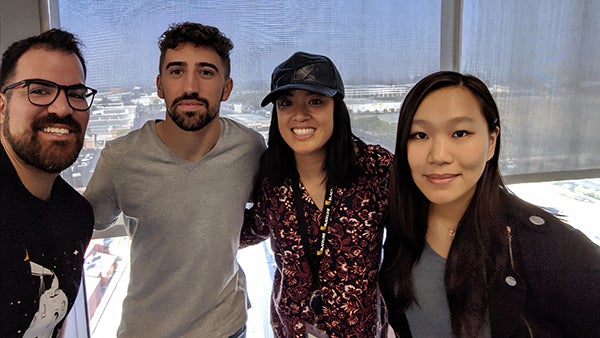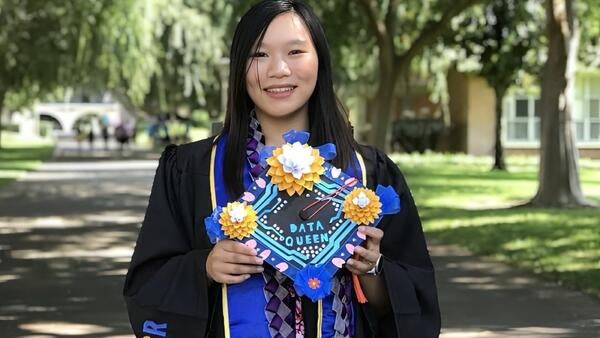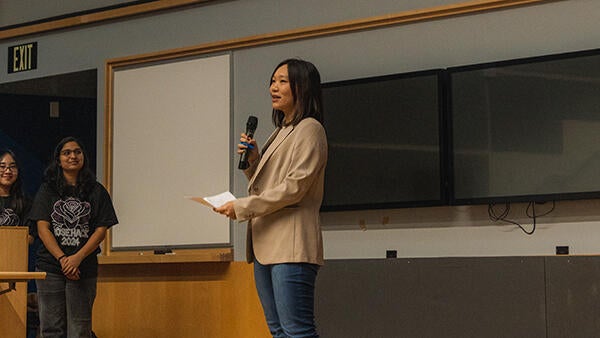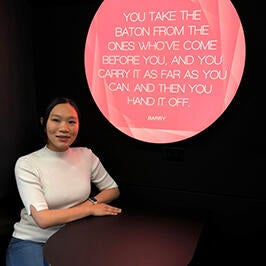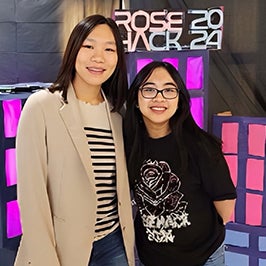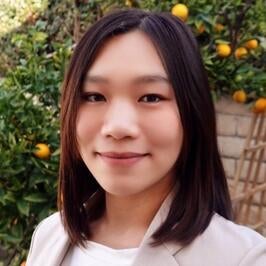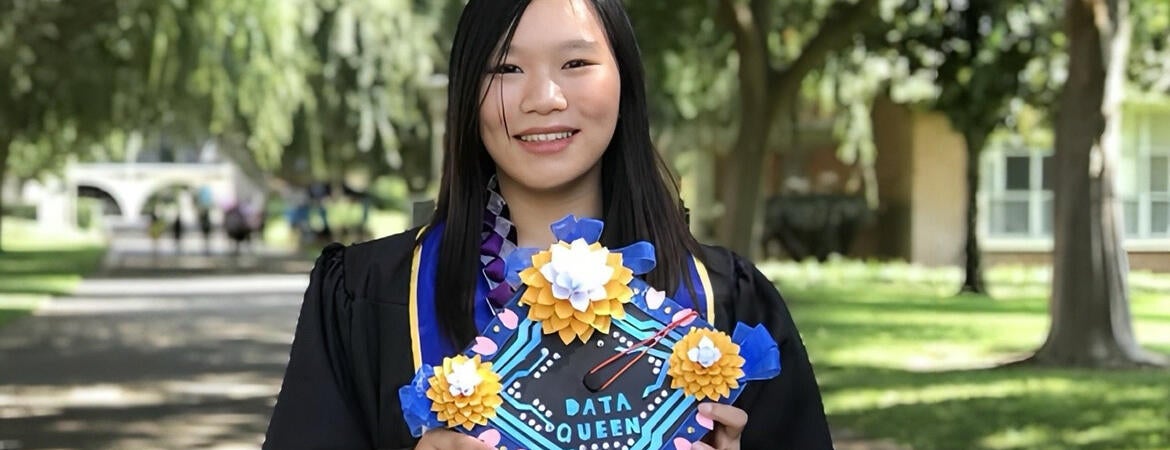
Cybersecurity expert Annie Du (BS, Computer Engineering, ’19) recalls a life lesson from her time at the Marlan and Rosemary Bourns College of Engineering (BCOE). The instructor asked the class: How many of you are satisfied — or, say, 70 percent satisfied — with your life and abilities?
After most students raised their hands, the professor replied that he himself was only 30 percent satisfied, given how much he could improve.
“That really hit me,” said Du, 26. “There’s always so much more to know. I don’t think I’ll ever be satisfied.”
That’s one reason Du has impressed as a security engineer — first at BlackLine, an accounting software company, and now at Netflix, the streamer of hits like Geek Girl, Bridgerton, and Stranger Things.
At Netflix, Du helps protect information, prevent cyber damage, and preserve subscriber access to bingeable series.
Her typical day might entail planning security, responding to alerts and incidents, hunting for possible internal/external threats, and remediating vulnerabilities by assessing risks.
“It’s both tactical and strategic,” she said.
She squares off against hackers who are, in her words, “getting more cunning by the day.” It takes a relentless mindset to defeat them not once, not twice, but again and again and again.
***
“We’re kind of playing a game of chess, really.”
That’s how Du described the internal role-playing between the red and blue teams at Netflix.
The two squads compete and cooperate like yin and yang: Team Red creates, anticipates, and replicates real-world-type incursions to test security controls. On the other hand, Team Blue prevents, repels, and remediates threats. It’s an offense against defense, spy vs. spy: “securing vs. taking advantage.”
“When most people hear of cybersecurity, they think of the hackers in the hoodies and the dark web,” Du said. “It was interesting to see the other side. I chose the blue team because I’m more of a protector."
***
Du’s journey from the Asian communities of Southern California’s San Gabriel Valley (often referred to by “626” — the region’s predominant area code) to digital guardian began at age 3.
That’s when she received her first computer, a Windows 2000 PC. It was big and bulky, mysterious.
“I remember my dad being really excited, putting me on a chair in front of the computer and saying, ‘Look you can play these games,’” such as solitaire and Minesweeper, Du said.
Her data-engineer father “lived and breathed” tech, while her mother was a real estate agent. Unlike one stereotype of Asian families, there was no pressure to earn A+ grades and pursue a prestigious career. Instead, Du was left to choose her path.
In high school, she began to do so: After growing up with computers, she was more tech-savvy than her peers, deemed books difficult to use, and found that technology “just came naturally.”
That’s when she knew. “I realized that computers would get even bigger in the future and would be in my life forever,” she said, “and that this is what set me apart.”
***
Then, at BCOE, she accidentally found her passion.
Du recalled herself as shy, timid, and introverted; she feared unfamiliar situations. So, she figured she’d become a data engineer like her father, perhaps with an emphasis on emerging technologies such as machine learning.
She was diverted from this comfortable path by two courses at BCOE: computer networks and cybersecurity — which she only took because her degree required additional technical electives.
“Little did I know that this class, computer networks, would essentially explain to me how the internet works in a detail I could not have imagined,” Du said. “Then, when I took cybersecurity, it was like a new world opened up … The dark world of the internet opened up and lured me right in.”
***
“Suddenly, I became hyper-aware of security in the tech world and wanted to learn more about how to stay safe in this largely connected world,” she continued.
Her desire to protect — herself, her loved ones, her company, and people in general — grew from her family background, Du said. She has two sisters, the youngest of whom has Down syndrome. Of the three siblings, she is the independent one.
“I have to be there for my family, take care of them— be better,” she said. “I have to be their safety net.”
Her parents have their hands full as caretakers. The thought of becoming a burden on them herself is unthinkable to Du.
***
That’s part of why she’s always learning, growing, improving.
While she joined Netflix in March to build her technical skills, her greatest challenge at work is persuasion: convincing managers to adopt security controls despite speed, cost, and convenience trade-offs
Such soft skills, she said, “are very difficult for most technical people,” who, like her, tend toward introversion.
“People associate security with blocking, hindering, slowing down,” she said. “But it’s also about cost-benefit and risk analysis. It can be difficult to convince the business or the engineers developing software that you’ve found a necessary technical control.”
***
This year, her success brought an invitation, which led to what Du called her“greatest achievement.”
In January, she was the keynote speaker at Rose Hack, an annual hackathon that was founded by the Society of Women Engineers (SWE) and Women in Computer (WinC) in 2018.
hosted by BCOE to support women and other underrepresented groups in technology.
In a post on LinkedIn, Du wrote: “When I heard about this opportunity, I was obsessed. I imagined myself 5 years ago. How did I feel then? How scared was I that I would fail as a woman engineer? Worried that I would end up jobless and working at a minimum-wage job despite all my efforts? How would I tell these women, in the same position I was 5 years ago, that it’s actually all okay? That it’s not that scary anymore?”
Today, reflecting back, she said:
“One thing a lot of people struggle with that causes imposter syndrome is the lack of acknowledgment. … So when I was asked to be the keynote speaker, I felt a sense of achievement and validation … It was a huge sign that I was doing well.”
Rose Hack also underscored that women can thrive in tech broadly, she said. While she was among the only women in some classes at BCOE, she always felt supported at the college, never faced discrimination herself, and was pleased to see that almost half of Rose Hack’s attendees were women.
“It’s more balanced now,” she said. “Times have changed. I think it will only get better from here.”
***
So is Du satisfied today with her life and skill sets?
“To most, my life is amazing, but I would say I’m 30 percent satisfied," she said. I believe there is so much potential in my life and what I’m capable of — I’ve only scratched the surface.”
Q&A WITH ANNIE DU
On what it takes to reach the top of her field:
Courage and the constant feeling of improvement, and feedback from others. The latter is where courage comes in. Ask others how you can improve and be willing to implement it. … I think the greatest trait that helped me be successful is my desire to improve myself.
On advice for women engineers at BCOE:
Overcome your fear with passion. Overcome your fear of not meeting qualifications and just apply to opportunities. If you can show recruiters your passion and your ability to accept mistakes or lack of knowledge as learning opportunities, you will be more than qualified.
On her interests and hobbies:
I think it’s important to be able to separate yourself from your career to indulge in the simple things in life. That said, my hobbies outside of work currently are baking bread/pastries, reading fiction, and manga, watching anime, and keeping my four kitties alive and happy!
Header image: Annie Du's 2019 Commencement photo (Photo courtesy of Annie Du).
